Hey Democrats: Stop fiddling while Trump burns America


Someone has to stop the Mad King.

I used to follow Noah Smith, before I left Twitter several years ago. He was a pretty standard progressive, in the Krugman/Bernstein/Reich mold.
I like him better now. Very non-standard! 
There are links in the seed.

The U.S. stock market continues to crash, as investors realize that Trump's insanely high tariffs are not going to be quickly walked back:
U.S. stock futures dropped on Sunday evening as the White House remained defiant even after a two-day historic stock market rout that followed President Donald Trump's rollout of shockingly high tariff rates on most key U.S. trading partners…Dow Jones Industrial average futures fell 1,531 points, or 4% Sunday evening, pointing to another brutal session ahead on Monday. S&P 500 futures shed 4%. Nasdaq-100 futures lost 4%.
S&P 500 futures are now down 15% in just three trading sessions. It's no longer hyperbolic to call this a "crash". In just a few days, Donald Trump's policies have already caused more than $5 trillion of American wealth to vanish into thin air. If Monday's markets go as expected, that could quickly become $10 trillion.1 And that's just the first three days. Many investors still expect tariffs to be temporary:
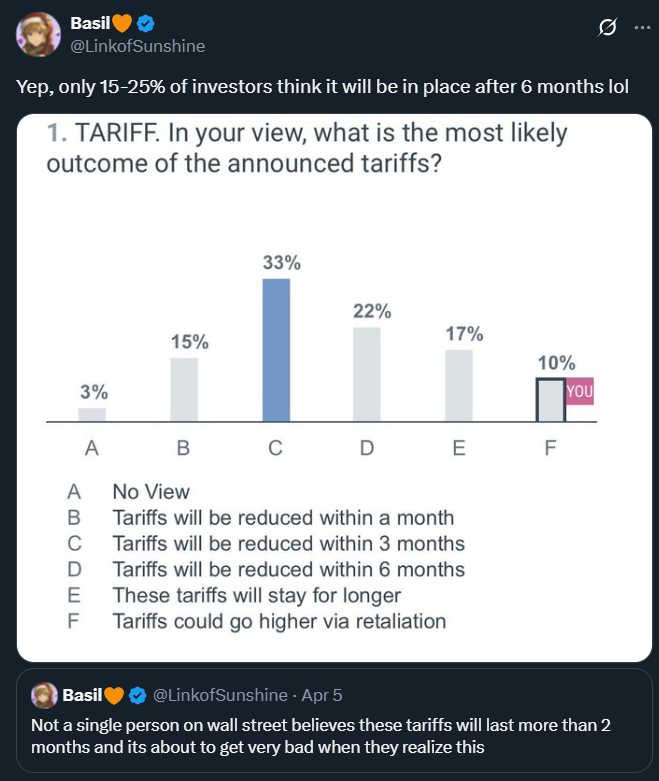
That means even the crash we've already experienced could be just the beginning of what's to come.
The American public, quite rightly, is freaking out over this wanton economic destruction. Support for tariffs was never above 50%, and is totally in the basement right now. The economy, jobs, and international trade have joined foreign policy as the issues on which Americans disapprove of Trump the most:
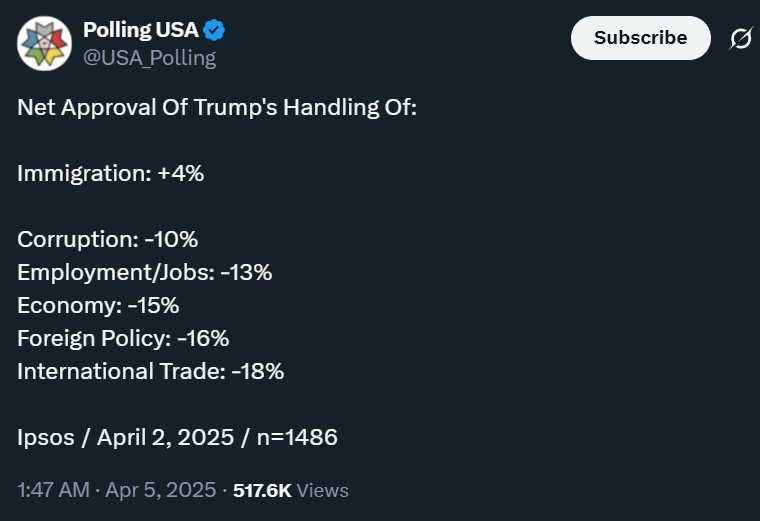
Negativity about U.S. government's economic policy has spiked to levels higher than in the Great Recession:
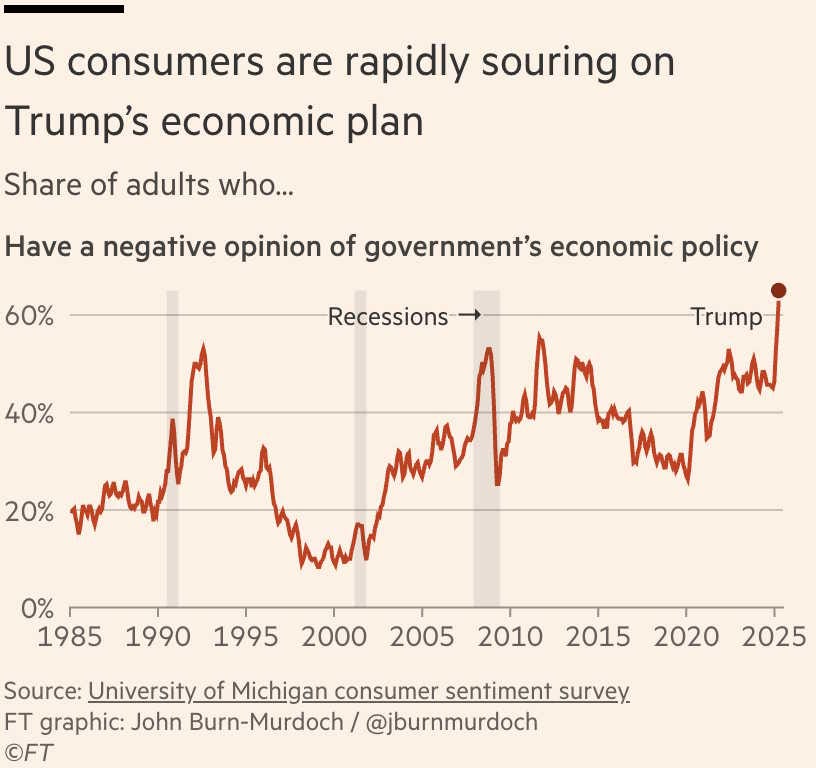 Source: John Burn-Murdoch
Source: John Burn-Murdoch
It's not just the stock market, either. Most Americans expect the tariffs to have a negative effect on the real economy, meaning higher unemployment and falling incomes:
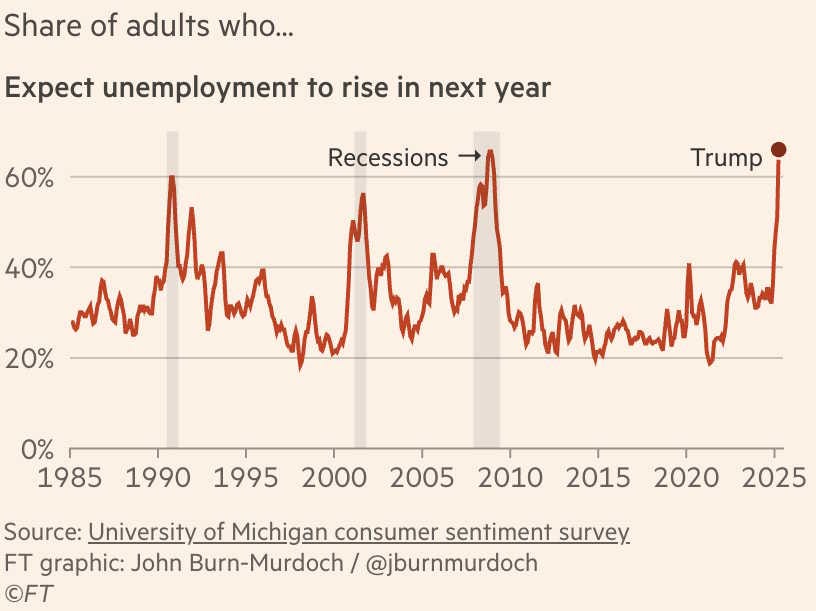 Source: John Burn-Murdoch
Source: John Burn-Murdoch 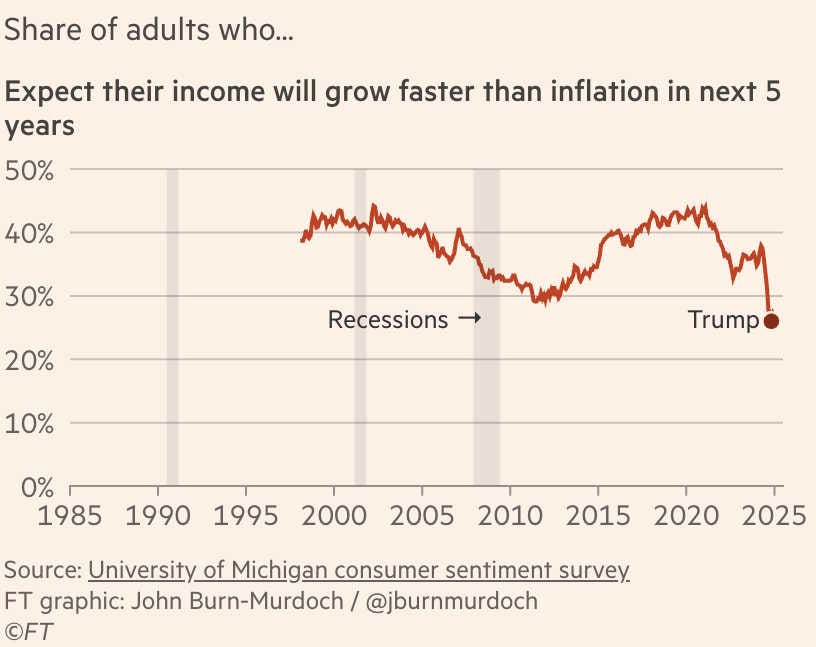 Source: John Burn-Murdoch
Source: John Burn-Murdoch
Private forecasters are raising their probabilities of an imminent recession. Prediction markets agree.
Meanwhile, Mad King Trump is bragging about crashing the stock market:
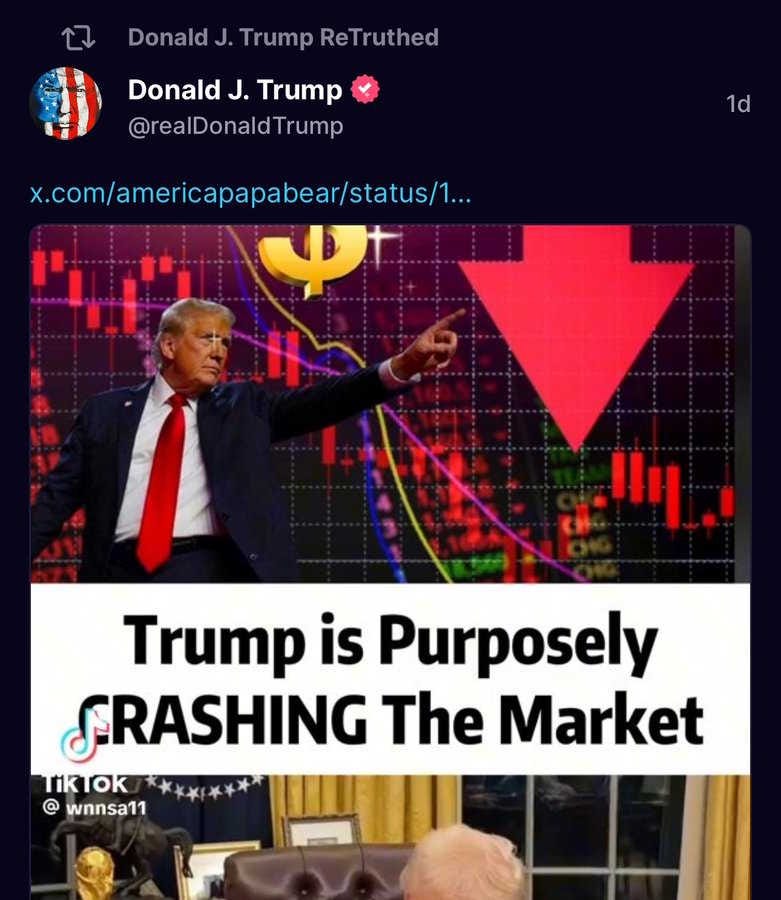
Even some of Trump's allies and supporters are starting to get cold feet, with Bill Ackman declaring that "we are heading for a self-induced, economic nuclear winter", and Elon Musk calling for a zero-tariff free trade zone with Europe. Musk also blasted Trump's economic advisor Peter Navarro, who is probably the most influential proponent of tariffs.2
Now, it's important to remember that Congress could step in and stop this madness at any time. The power to enact tariffs is Constitutionally reserved for Congress, and the only reason Trump is able to unilaterally create these tariffs is that Congress granted the President this ability with a series of laws. At any moment, Congress could simply pass a new law and make these tariffs vanish.
And in fact, at least two such bills are now being proposed — one by Chuck Grassley and Maria Cantwell in the Senate, and one by Don Bacon in the House of Representatives. That's good! I hope they pass, even though Trump will just veto them. Eventually, if things get bad enough and Trump's popularity sags enough, Democrats and Republicans could unite two form the two-thirds majority required to override the veto and end the tariff nightmare.
But one thing you should immediately notice is that of the three legislators leading the charge against tariffs, two — Bacon and Grassley — are Republicans. Democrats, by and large, have not been at the forefront of the fight.
This doesn't mean Democrats are completely staying silent. Many are putting out statements opposing the tariffs, like this one by Nancy Pelosi:
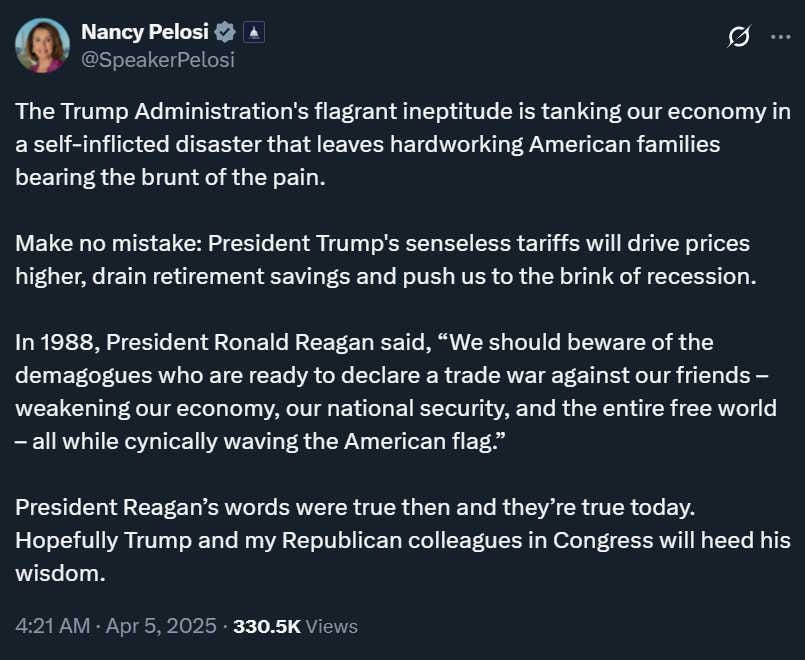
But there has so far been nothing like the rhetorical fire with which progressives attacked Elon Musk's DOGE. Bernie Sanders responded to DOGE with a barn-burning "Stop Oligarchy" tour that drew huge crowds. But his response to tariffs has been measured and equivocal:
As someone who helped lead the effort against disastrous, unfettered free trade deals with China, Mexico and other low-wage countries, I understand that we need trade policies that benefit American workers, not just the CEOs of large corporations. And that includes targeted tariffs which can be a powerful tool in stopping corporations from outsourcing American jobs and factories abroad. Bottom line: We need a rational, well-thought-out and fair trade policy. Trump's across-the-board tariffs are not the way to do it. We do not need a blanket and arbitrary sales tax on imported goods which will raise prices on products that the American people desperately need. We should be doing everything we can to lower prices, not make them incredibly higher.
A few Democrats have even teetered on the brink of apologia for Trump's tariffs. Congressman Chris Deluzio3 from Pennsylvania put out a statement criticizing the implementation of Trump's policy, but appearing to endorse the overall approach, and calling for price controls as a remedy to tariff-induced inflation:
I support using tariffs as a tool against bad actors and trade cheats—like Communist China. I support using tariffs strategically alongside muscular industrial and pro-worker policies to protect American jobs and consumers. And I support renegotiating—aggressively—trade deals like the USMCA to get the best possible deal for hardworking Americans like us in Western Pennsylvania…I do not support the decades-long Washington consensus on free trade that has crushed American industry and jobs and given us far-flung supply chains that too often fail. It has been a bad deal for us in the Rust Belt and beyond. And I do not support allowing foreign trade cheats to exploit their workers to undercut American jobs…The President has the power to stop corporations from using the cover of tariffs to price gouge people—why won't he use it?
The House Democrats tweeted a video of Deluzio delivering a similar statement, and added some text suggesting qualified support for Trump's general approach:
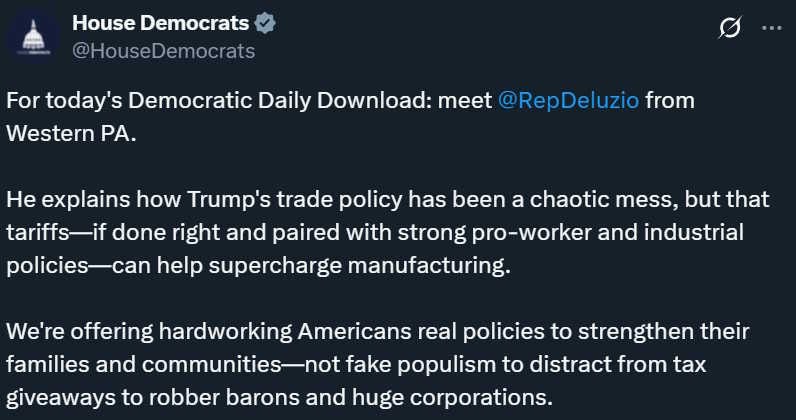
This is, to put it bluntly, nuts. No President has ever intentionally caused the kind of intentional devastation that Trump is inflicting on the stock market and will soon inflict on the U.S. economy. In terms of policy mistakes in the last century, only the Iraq War compares, and that debacle unfolded over many years. Democrats have an absolutely golden opportunity to be blasting Trump from every rooftop and riding an unprecedented wave of anger to total Congressional victory in the 2026 midterms. Yet instead they're releasing bland statements, getting lost in nuance, and letting Republicans take the lead on defending American prosperity from their Mad King.
What's going on? If this were a strategic, calculated move on Democrats' part — letting the GOP coalition tear itself apart before moving in to capitalize on their divisions — I would expect Dems to simply issue more statements like Pelosi's, instead of issuing tortured quasi-defenses of tariffs like Deluzio's. Instead, it seems clear that what's happening is that Trump is actually implementing the great pushback against neoliberalism that progressives have been dreaming about for decades, and Dems don't quite know how to deal with the fact that it's rapidly turning into a total flaming disaster.
Trump's embrace of tariffs is actually a political reversal of sorts. For decades it was Democrats and the labor left who worried that trade agreements were undermining American organized labor, sending U.S. jobs to low-wage countries, and despoiling the environment. In recent years, it was progressives who decided that neoliberalism — which includes free trade as one of its main pillars — was at the heart of America's problems.
"Anti-neoliberalism" was the idea that the modern progressive movement coalesced around. Socialist pundits hurled the term "neoliberal" at anything they didn't like. Progressive think tanks like the Roosevelt Institute and the Hewlett Foundation funded thinkers and events dedicated to deciding what would come after neoliberalism (I myself went to some of these events). The Warren movement — an intellectual elite project with considerable influence in the Biden administration — began to operationalize the concept, with things like antitrust, price controls, and increased support for unions as the key policy instruments. More national-security-minded liberals like Jake Sullivan and Jennifer Harris focused more on industrial policy (which I also supported strongly). The Sanders movement — a populist movement that influenced policy a bit but never managed to gain power — called for even more dramatic policies, including punitively high taxes and nationalization of industry.
You'll notice that tariffs and trade deficits didn't figure prominently in any of these lists. Anti-neoliberalism was definitely skeptical of free trade, and Biden put strategic, targeted tariffs on specific Chinese products. But tariffs were never a very important piece of anti-neoliberal ideology, and few progressives cited trade deficits as evidence that America was being taken advantage of by other nations. Even the most ardent Bernie supporters probably would have balked at the level of trade destruction that Trump is trying to implement now (and Bernie himself certainly would have).
But if the progressive anti-neoliberal movement was puttering along in the slow lane, Trump just blew right past them in his hot rod. Trump has now seized the mantle of anti-neoliberalism, and is pushing it much further, in directions the movement's erstwhile leaders never dreamed of.
Now progressive leaders are afraid that if they fight Trump by taking up the mantle of free trade, and if they succeed, their entire anti-neoliberal program will be thrown out along with the tariffs. I suppose it's a reasonable fear. Trump has already caused most Americans to take a more positive view of free trade, and as the economic devastation of tariffs spreads, the backlash will probably intensify even further:
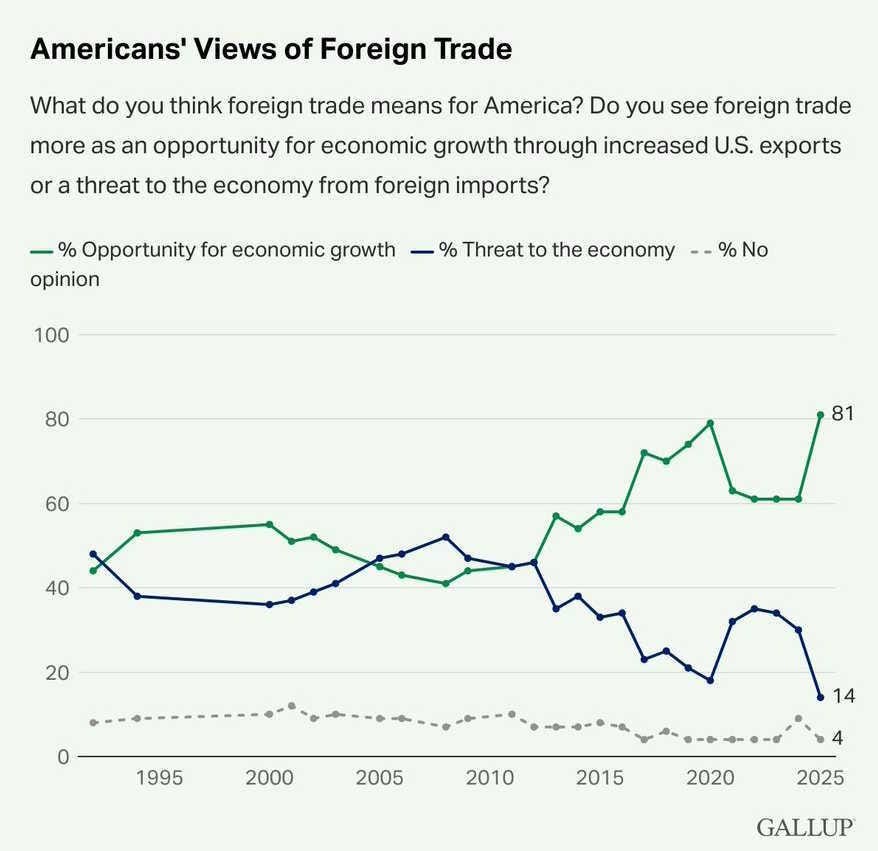 Source: Gallup
Source: Gallup
We could indeed be looking at a generational shift back toward free trade. And that could definitely jeopardize progressives' generational anti-neoliberal project.
This possibility has anti-neoliberal thinkers and activists a bit panicked, and as a result they're equivocating furiously:
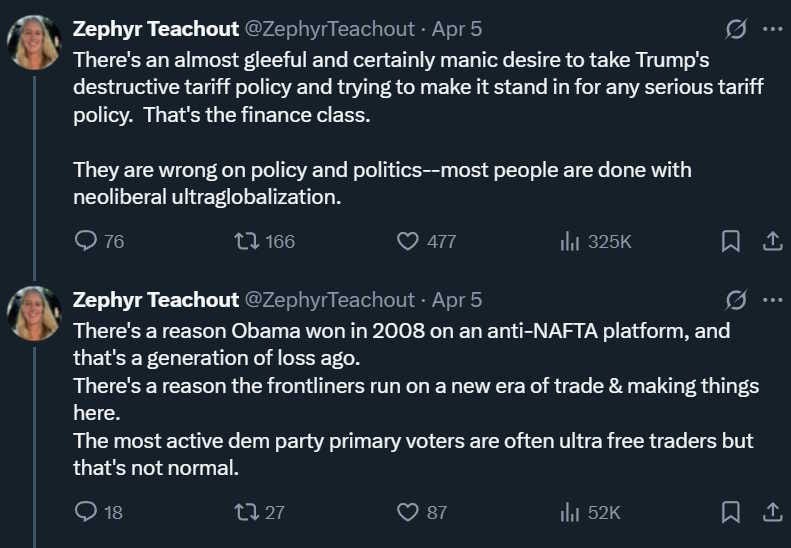

This way lies absolute failure for the progressive movement. It's not just that Democrats who take this attitude will let a once-in-a-lifetime opportunity to win power slip through their notoriously buttery fingers (although that is certainly true). It's also that by refusing to unequivocally condemn and oppose the worst act of economic self-sabotage in modern American history, progressives will hand their neoliberal rivals within the Democratic party a grand intellectual victory, and consign their nascent revolution to the dustbin of history.
Perhaps some progressives imagine that after Trump wreaks his damage, Democrats will retake power, but will leave some of Trump's tariffs in place. Such things have happened before — for example, Biden kept Trump's tariffs on China from his first term. Progressives may tell themselves that Trump is moving the Overton Window for them, and that after he's gone they'll sort of slither back in and get to offer a more moderate version of anti-neoliberalism as a compromise.
I highly doubt this will happen. The reason Trump's first-term tariffs were allowed to stick around was that they didn't do much damage. When Americans really suffer economically — for example, after the crash of 2008 — they often turn completely against whatever is perceived to have caused them pain. After the financial crisis, they turned against the finance industry, and the result was the tightest regulation of that industry since World War 2. After Enron, the Sarbanes-Oxley bill arguably overcorrected in terms of regulating corporate accounting. And after the Smoot-Hawley tariffs of 1929 — which were far smaller than what Trump is doing now — free trade became a dogma that lasted many generations.
After this is all over, if Americans decide that "anti-neoliberalism" means tariffs, they will build shrines to Milton Friedman in their front yards.4 If ideas like industrial policy, antitrust, and higher taxes are associated with tariffs, they too will be discarded . The discourse will be full of people saying things like this:

If progressives and the Democrats who listen to them want to salvage anything from their project — and I agree that there are important pieces worth salvaging — they're going to have to come up with something a lot better than "Well, tariffs are good if done right, but these Trump tariffs are implemented poorly, blah blah blah."
Fortunately, it should easily be possible to attack Trump's tariffs with maximum force without talking about "neoliberalism" or other big ideological concepts. Tariffs are going to crush the American working class, so just say that . Tariffs are going to greatly accelerate the deindustrialization of the United States, and throw factory workers out of work, so just say that . Tariffs are going to make the middle class poorer, raise unemployment, destroy retirement savings, and erode purchasing power, so just say that .
You don't have to connect anything to "neoliberalism" or "elites" or "the finance class" or any of that stuff. You don't have to make it part of some broader ideological contest. That kind of thinking might resonate with the Democratic staffer class who handle legislators' Twitter accounts, but average voters don't really need much of a message beyond "tariffs bad, hence Trump bad". Tariffs were never a major part of the progressive program — heck, Franklin D. Roosevelt decreased tariffs by a huge amount with the Trade Agreement Act of 1934.
And you can still say industrial policy and antitrust are good! You don't have to connect those things in your rhetoric, even if they're connected in your own mind by some theory about "neoliberalism". Just throw tariffs under the bus, and spare the American people the college lecture about ideology.
Also, Dems really stop trying to make this about class warfare. Some Democrats are lamely trying to claim that the rich will benefit from tariffs:
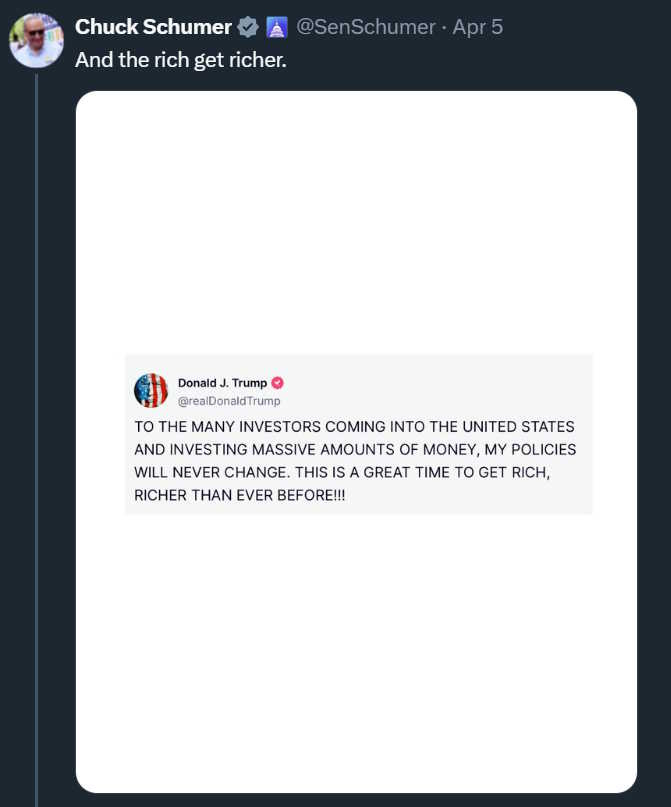
No one is dumb enough to believe this. Everyone knows that rich people own a bunch of stocks, and that when the market crashes, rich people take a huge hit.
Class warfare was always a weak platform to try to win back the country. But trying to shoehorn tariffs into a "billionaires versus everyone else" narrative is simply ludicrous. This really is one of those Pareto improvement situations they teach you about in Econ 101, where a stupid policy is hurting billionaires and working-class Americans alike. A rising tide really does lift all boats when you stop a madman from drilling a hole in the hull.
In short, Democrats and progressives need to take the lead in the fight against the Mad King and his tariff madness. Tariffs are clearly not a viable economic or political program, and the people who take the lead in beating it back will become the de facto leaders of American economic policy. Be those people.
1 For reference, the largest U.S. trade deficit ever recorded was less than $1 trillion. There's no good reason to compare stock market crashes to trade deficits, because trade deficits don't actually represent losses of American wealth at all. But even in some fantasy universe where they did, Trump's stock market crash would still be much, much larger.
2 So much for the "Shadow President Elon" theory, eh?
3 Nominative determinism remains undefeated.
4 OK, this is probably an exaggeration. I hope.
Whatever



Ever since I started seeding LOTS of articles explaining why Trump's are a bad idea, I've constantly requested that our MAGA members seed articles that explain how Trump's tariffs were determined and why they are a good thing.
The silence is deafening.
As I've said - the Dems are playing politics instead of governing.
What can democrats fight this president with. . . the ridiculous public sat on its. . . 'duffs' and let republicans out-vote them in house, senate, and presidency. A tri-fecta. Hell, even the SCOTUS with a retirement or death of one of the 'three' justices could gain another politician-induced conservative justice because of weak voters lack of interest and participation.
The movie, The Ten Commandments, keeps coming to my mind when I read statements that 'demand' the democratic party do more: "How can we make brick without straw?'
I have had it up to my eyeballs with columnists giving advice to democrats about how to fight Trump's policies! When are writers going to use their 'inkwells' to give solid advice to the hard-headed (stubborn) republicans who are running our representative government?